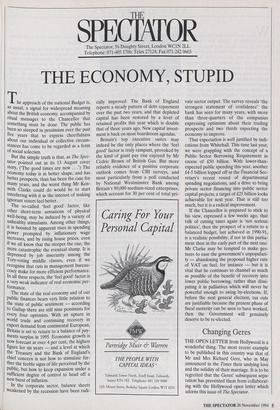THE
SPECTATOR
The Spectator, 56 Doughty Street, London WC1N 2LL Telephone: 071-405 1706; Telex 27124; Fax 071-242 0603
THE ECONOMY, STUPID
The approach of the national Budget is, as usual, a signal for widespread moaning about the British economy, accompanied by ritual messages to the Chancellor that something must be done. The public has been so steeped in pessimism over the past five years that to express cheerfulness about our individual or collective circum- stances has come to be regarded as a form of social solecism.
But the simple truth is that, as The Spec- tator pointed out in its 13 August cover story, (The good times are now . . .') The economy today is in better shape, and has better prospects, than has been the case for many years, and the worst thing Mr Ken- neth Clarke could do would be to start interfering with it in the interest of making ignorant voters feel better.
The so-called 'feel good' factor, like other short-term sensations of physical well-being, may be induced by a variety of unhealthy stimulants. Among other things, it is boosted by apparent rises in spending power prompted by inflationary wage increases, and by rising house prices, even if we all know that the steeper the rise, the more catastrophic the eventual slump. It is depressed by job insecurity among the Tory-voting middle classes, even if we recognise that cuts in management bureau- cracy make for more efficient performance. In all these respects, the 'feel good' factor is a very weak indicator of real economic per- formance.
The state of the real economy and of our public finances bears very little relation to the state of public sentiment — according to Gallup there are still nine pessimists for every four optimists. With an upturn in world trade and continuing recovery in export demand from continental European, Britain is set to return to a balance of pay- ments surplus in 1995. Economic growth is now forecast at over 4 per cent, the highest figure for six years — and a level at which the Treasury and the Bank of England's chief concern is not how to stimulate fur- ther the feeble signs of life perceived by the public, but how to keep expansion under a sufficient degree of control to head off a new burst of inflation.
In the corporate sector, balance sheets weakened by the recession have been radi-
cally improved. The Bank of England reports a steady pattern of debt repayment over the past two years, and that depleted capital has been restored by a level of retained profits this year which is double that of three years ago. New capital invest- ment is back on most boardroom agendas.
Britain's top executive suites may indeed be the only places where the 'feel good' factor is truly rampant, provoked by the kind of giant pay rise enjoyed by Mr Cedric Brown of British Gas. But more reliable evidence of a positive corporate outlook comes from CBI surveys, and most particularly from a poll conducted by National Westminster Bank among Britain's 90,000 medium-sized enterprises, which account for 30 per cent of total pri-
vate sector output. The survey reveals 'the strongest statement of confidence' the bank has seen for many years, with more than three-quarters of the companies expressing optimism about their trading prospects and two thirds expecting the economy to improve.
That expectation is well justified by indi- cations from Whitehall. This time last year, we were grappling with the concept of a Public Sector Borrowing Requirement in excess of £50 billion. With lower-than- expected public spending this year, another £4-5 billion lopped off in the Financial Sec- retary's recent round of departmental spending negotiations, and a drive to bring private sector financing into public sector capital projects, a target of £25 billion looks achievable for next year. That is still too much, but it is a radical improvement.
If the Chancellor is prepared to stick to his view, expressed a few weeks ago, that talk of cutting taxes again is 'not serious politics', then the prospect of a return to a balanced budget, last achieved in 1990-91, is a realistic possibility, if not in this parlia- ment then in the early part of the next one. Mr Clarke may be tempted to make ges- tures to ease the government's unpopulari- ty — abandoning the proposed higher rate of VAT on fuel, for instance — but it is vital that he continues to channel as much as possible of the benefit of recovery into lower public borrowing, rather than dissi- pating it in palliatives which will never be powerful enough to swing by-elections. If, before the next general election, tax cuts are justifiable because the present phase of fiscal austerity can be seen to have worked, then the Government will genuinely deserve to be re-elected.










































































 Previous page
Previous page